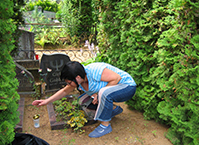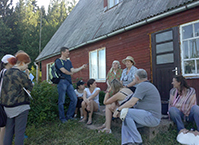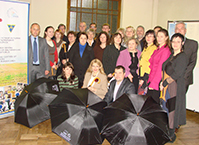Аbout the games and toys in the childhood
Categories: Holidays and traditions, Anton Slishan
Story-teller: “I spent my childhood in herding. I herded alone. If there were some children, then they simply ran to me, but the basic game was tripakas or hide-and-seek. Oh, and then it didn’t matter how old you were. Beginning with the age of 4-5, if only you could understand, instead of crying, that you had been found and you felt like crying, or if you couldn’t be the seeker. From that age and up to young people of the service age. Everybody were playing together. The villages – one, two, three – came together and, and I remember, there were horses in our yard. You see, some had come by carts. The stableman had five children, we were three kids, the neighbours had five kids, and the other neighbours, and the other ones. And that – the horse pen – was a good place to play hide-and-seek. It even happened that some got on the roof and clung to the chimney. Do you understand? You see the hands, run there, but he turns around. You cannot understand what that person is. We hid in the house, in the cellar, pamasts, we named it pamasts, we hid there, we crept into the bread oven, you see. There were the rhymes, too.”
Interviewer: “Do you remember any rhyme?”
Story-teller: “Actually, the simplest one was “That one Turkish bean was travelling to England.” I don’t know why this rhyme, but it had.., maybe, it was popular at school or maybe not – England was locked and the key was broken, one, two, three, it was said, the key is necessary to open England, you see, one, two, three, and you are free, you see. “Anni, banni, sikerasū, Anni, banni, traps.” That was another rhyme; that was the rhyme for sure. And there were more rhymes, the rest that I have included in that poem, they are included, I don’t remember them anymore, you see. And there was also, there was, I don’t remember it anymore, but, but that “Turkish bean was travelling to England” was the most popular one. England, England was locked, something was said about the number of nails, one, two, three, and now you are free. And the one who was left had to go and seek. The others hid. And those who hid, there was a certain place where the rhyme was cited, I think it was at the barn door, usually at the barn door, where the seeker counted to ten or he had to count to a hundred. No, not a hundred, but to ten, thirty. And you had to run there and knock three times, if you wanted that you weren’t found, you see. And when we played, there was such a cellar in our yard and there was water in that cellar. My father hadn’t managed to finish building it because the war broke out. And usually we tried to entice the neighbours’ kids there, that they would jump through the window, hide in the cellar, jump into that water. Such a leg-pull. A leg-pull. But I mean, you see, that, that adults, young people were playing together with us.”
Interviewer: “What about toys, wooden toys, or rag dolls?”
Story-teller: “Toys, you know, there were different self-made cars, there was another game, children play it nowadays too – making pancakes of, of, of sand, I remember that very well. I myself participated in that game, together with the girls. That was, that was the tradition. Dolls? My sisters did not have any dolls. I had a doll. That’s interest… I had a doll. And I had a doll, that was not a female, but the male doll. I got it as a present, when I was, I think, four or five years old; my father’s cousin presented it to me, she lived in the neighbourhood. She studied in Preiļi, at that post-war time there was some technical school. Therefore she studied there; she visited us at Christmas and gave me that doll.”
Interviewer: “Was it bought?”
Story-teller: “And I have always kept that doll as a relic, that doll was torn by my, my sister’s older daughter, my goddaughter. She came, she spent summers here, I had to allow her to play, and thus she liquidated that doll.”
Images
Audio
Researcher: Dr. philol. Gatis Ozoliņš, Daugavpils Universitāte













